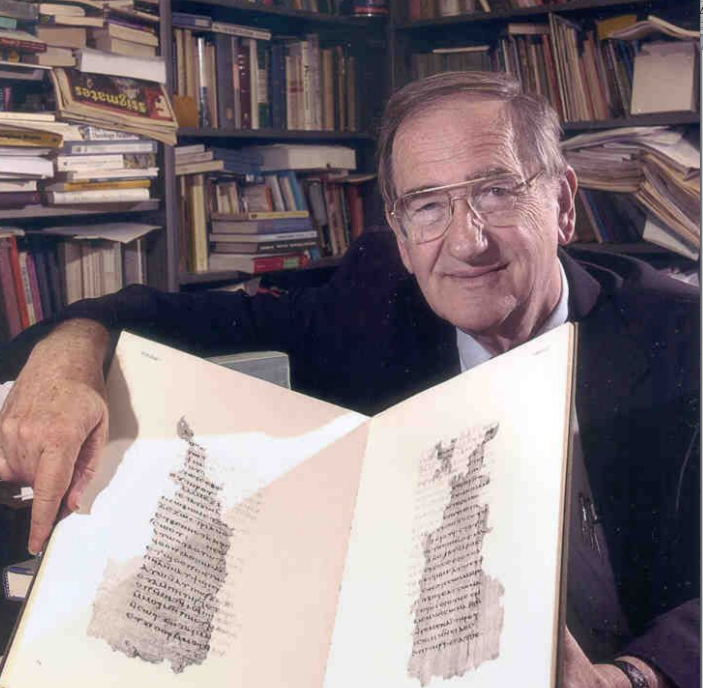
An internationally recognized religious studies professor at UNL has been honored with a “Festschrift” — a collection of scholarly essays by those who have been influenced by his work.
John D. Turner, Cotner Professor of Religious Studies at UNL since 1976, is recognized worldwide for his study of the Nag Hammadi codices, which are ancient papyrus documents discovered in Egypt in 1945 that changed scholars’ understanding of how Christianity developed.
More than 30 scholars from around the world contributed to the Festschrift, “Gnosticism, Platonism and the Late Ancient World,” published by the Brill publishing house earlier this year. Turner was formally presented with the work during a reception Nov. 23 at the annual meeting of the Society of Biblical Literature and the American Academy of Religion in Baltimore.
Festschrifts reflect high honor for scholars. Turner is one of few UNL scholars to be so recognized in recent years.
“It’s an honor you can’t solicit, or prepare for. Either your colleagues and students want to do one, or they don’t even think of doing one,” said Stephen Burnett, professor and chair of UNL’s Classics and Religious Studies Department.
“John is not only distinguished, he’s beloved at the same time,” said Kevin Corrigan, Samuel Candler Dobbs Professor of Interdisciplinary Humanities at Emory University.
Corrigan, who also serves as chair of the Graduate Institute of the Liberal Arts at Emory, has frequently collaborated with Turner on books and other scholarly projects over the years.
A Festschrift — German for “celebratory writing” — is not merely a collection of accolades, Corrigan said. It is a presentation of scholarly articles intended to advance the honoree’s area of study.
“First of all, it’s an immense honor,” Corrigan said. “Secondly, it’s the top level of scholarship in the world. The people who contributed here read like a world’s who’s who.” Turner has been at the heart of two revolutions in scholarly thinking during the past 40 years, Corrigan said. He was part of a team led by Gnostic scholar James Robinson that translated the Nag Hammadi codices to make them accessible to scholars around the world.
“It revolutionized our understanding of ancient religious, theological and philosophical thought and practices,” Corrigan said.
And, as a visiting research professor at Université Laval in Quebec, Turner helped to produce French-language critical editions of three treatises from the Nag Hammadi library.
“If you think about it, for an American to be invited to a Francophone community to work on these editions, it’s almost unparalleled,” Corrigan said. Turner, for example, helped persuade him of the connections between Gnosticism, sects that emphasized knowledge and ritual purity, and Platonism, the thought developed by the Greek philosopher Plato and subsequent thinkers.
“To put it simply, it’s like showing the Dark Ages weren’t so dark,” he said.
Corrigan said Turner’s admirers organized an editorial group about three years ago, with a goal of presenting a Festschrift to mark Turner’s 75th birthday in July 2013. Among the contributors was Karen L. King, Hollis Professor of Divinity at the Harvard Divinity School.
King met Turner when, as an undergraduate at the University of Montana in the early 1970s, she signed up for Turner’s class on the Nag Hammadi codices.
“I just happened to take it. I was a local Montana girl and this was a class in the religious department. It was serendipitous in a way,” she said. “He rather launched me on my whole career. He’s been both a mentor and a colleague for many years.”
After graduating from Dartmouth College in 1960, Turner served a stint in the Army, then worked as an actuary and a car salesman before entering the Union Theological Seminary in Virginia, seeking to become a Presbyterian minister. He discovered a love of ancient languages while in the seminary. Although he earned a master’s degree in theology in 1966, he decided against the ministry and instead entered Duke University’s religious program, seeking a doctorate in early Christianity. While at Duke, he joined a team of about 20-young American scholars, assembled by Robinson, to edit and translate the Nag Hammadi documents.
“John Turner’s scholarly career is practically synonymous with the decipherment, publication and interpretation of the Nag Hammadi texts,” wrote Sidnie White Crawford, a UNL professor of classics and religious studies who wrote an appreciation of Turner that opens the festschrift volume.
Turner helped to found a Religious Studies department at the University of Montana at Missoula in 1971. He came to UNL in 1976 to become the first and only Cotner Professor of Religion at UNL, created with endowed funds remaining from Cotner College, a Disciples of Christ school of religion that had recently closed.
Turner said he was both honored and surprised by the Festschrift. He remains an active scholar, pursuing new areas of research and teaching a full load of courses at UNL. He said he is one of a corps of busy older professors at UNL.
“We still haven’t run out of gas, we still enjoy teaching, we’re still pretty heavily involved in the scholarly scene in our respective fields,” Turner said. “I don’t really see myself as immediately doing anything different.”







